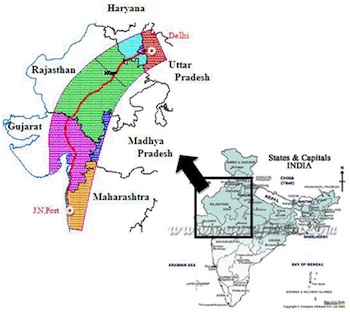India is embarking on an ambitious, $90 billion program to build smart, sustainable cities of the future, focusing in on a 1,483-kilometer corridor that connects Delhi and Mumbai, the country’s seats of business and political power.
Known for its smart city software, IBM has been selected to work with the Delhi-Mumbai Industrial Corridor Development Corporation on developing the corridor, which spans six Indian states.
Their master plan is based on state-of-the-art infrastructure that can serve as a model for linking and controlling intelligent municipal services in smart cities across India. The vision is to create a strong economic base that activates local commerce, enhances foreign investment and attains sustainable development along the corridor.
The first phase centers on the Dighi Port Industrial Area in Maharashtra, where IBM’s Intelligent Operations Center will integrate information from departments and agencies across the city to monitor energy consumption, water quality, traffic flow, and enhance public safety.
IBM will place sensors and smart devices across the city that monitor conditions and communicate data to the central command center where city administrators can use it to respond quickly to events in a coordinated manner.
Maharashtra is India’s second largest state in terms of population and third largest in terms of land area – it exports $44 million worth of products a year, 45% of India’s total. Mumbai, its capital city, is one of the India’s principal financial centers.
"We are pleased to have IBM as one of the key partners for this project to develop a city based on international standards in close proximity to Dighi Port. This will enhance economic growth, global competitiveness, social inclusion, and environmental sustainability in select cities," says Amitabh Kant, Chief Executive Officer and Managing Director, Delhi-Mumbai Industrial Corridor.
This map shows the corridor:

"This project provides the foundation to use technology in new ways to drive economic development, job growth and improve the quality of life for citizens," says Rahul Sharma, Executive Director, Partner & Smarter Cities Leader, Global Business Services, IBM India/South Asia. "IBM’s deep consulting expertise in smarter cities, as well as our practical experience from transforming thousands of cities worldwide will enable DMICDC to provide a better environment to attract citizens, new business and investments in the region."
The long term plan is for nine "mega industrial zones" to be connected by a high-speed freight line and a six lane expressway.
Three ports, six airports and a 4000 megawatt power plant will serve the area. Funds for the project are coming from the Indian government, Japanese loans and investments by Japanese companies. Approximately 180 million, or 14% of India’s population, will be affected by its development.
India is experiencing major urbanization, with an estimated 30 people leaving rural areas every minute during the next 20 years. At this rate, the country will need some 500 new cities in the next two decades, requiring innovative technologies and solutions to manage growing demands on city infrastructures that deliver vital services.
Learn more about the Dehli Mumbai Industrial Corridor:

Phulera is right area in smart city